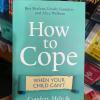To School Boards Everywhere:
My name is David James. I am a teacher and coach at College Park High School in The Woodlands, Texas, part of the Conroe Independent School District. I was hoping that I might have a few minutes of your time. I would like to talk to all of you about suicide. I know it is not a popular topic, and honestly, it is not an easy to talk about, and in some areas, it may even be taboo, but it is one that must be addressed, and you, as school boards have an obligation to the students of your districts. The majority of their parents voted for you, so you have an obligation.
I realize this may not be the best time for many of you. It is January, and for all the districts in Texas, that means that STAAR testing is just two and a half months away, in Massachusetts, the first part of the MCAS is less than a month away, our neighbors to the far north in Alaska will be getting AMPed up in March, and in the Heartland, Nebraskans will be looking forward to (or dreading) the NeSA. These tests are serious business. For some students, they determine if students should repeat a grade, and for others, if they will graduate. I know that high stakes testing is a big deal to many of you. After all, accountability ratings are important, as are state funds, but kids can't be tested if they are no longer with us.
I speak from experience when I say this. I lost my 13 year old son Peyton in October of 2014 after he hung himself. He was an eighth grader at Forbes Middle School in Georgetown, Texas. In no way am I abdicating my parental responsibility. Peyton's mother and I knew Peyton was suffering emotionally. He was diagnosed with depression and anxiety. We got him into counseling, and, through his doctor, were trying to find medications to help, but had not found one that provided the desired results. Unfortunately, we seem to be the exception, not the rule. Since Peyton's death, I have talked to other parents who lost children to suicide, and the most common threads in the narratives were "We never saw it coming" or "We had no idea our child was suicidal" and "They always seemed so happy."
To many, it may seem puzzling that these parents were in the dark about their children, and it is easy to dismiss these parents as neglectful, but one of the many things I have learned over my 25 years as an educator, kids are really good at hiding things, especially when it comes to mental health. Students in class rooms across the country, including your district, suffer in silence. They know that something is wrong with them, but they don't know what. They look around the room and mistakenly think they are the only one that feels different. They fear saying anything because they don't want to be ostracized or humiliated by their peers. They don't want to talk to talk to teachers, or counselors, or administrators for the same reasons. Well, that, plus we are adults, which means we would never understand.
Because education has become data driven, here is some data provided by the #JasonFoundation and the Centers for Disease Control (CDC):
Suicide is the SECOND leading cause of death for ages 10-24. (CDC)
Suicide is the SECOND leading cause of death for college-age youth and ages 12-18. (CDC)
More teenagers and young adults die from suicide than from cancer, heart disease, AIDS, birth defects, stroke, pneumonia, influenza, and chronic lung disease, COMBINED.
Each day in our nation there are an average of over 5,400 attempts by young people grades 7-12.
Four out of Five teens who attempt suicide have given clear warning signs
Over the past decade, however, the rate has again increased to 12.1 per 100,000. Every day, approximately 105 Americans die by suicide. (CDC)
There is one death by suicide in the US every 13 minutes. (CDC)
16% of students reported seriously considering suicide. (CDC)
13% of students reported creating a plan. (CDC)
In addition, according to the American Foundation for Suicide Prevention (AFSP), "At least 90 percent of all people who died by suicide were suffering from a mental illness at the time, most often depression. Among people who are depressed, intense emotional states such as desperation, hopelessness, anxiety, or rage increase the risk of suicide. People who are impulsive, or who use alcohol and drugs, are also at higher risk."If you walk into almost any classroom at any high school or middle school, you will easily find students that fit that description.
The same weekend that we lost Peyton, a junior at Georgetown High School took his life. Since then, I personally know of SEVEN student suicides just within Texas. The ages ranged from a ten year old in San Antonio to a senior in Rogers. The two most recent taking place here in the Woodlands within two weeks of each other. Through various message boards, Facebook groups, and the #PeytonHeartProject, I have been lucky to talk to parents across the country and around the world. To a person, we all agree that more can, and should, be done to educate not only students, but their parents (we grew up in an age when no one spoke of such things and could use the help).
So what can a school board do? Some states have enacted the #JasonFlattAct, that require regular training for teachers and staff in suicide recognition and prevention. If such a law exist in your state, make sure that it is followed and implemented. If not, lobby your state officials to pass such a law (such laws can be enacted with ZERO fiscal note). Even if there is no state law, what is to stop you from implementing policy locally? You could bring in experts from the community to speak to the students and/or the parents. You can enact programs designed to give students a safe place to go where they can talk to some one trained to deal with these problems. Yes, I understand that some of these things cost money, but is some one really going to complain that you are trying to save lives?
I know I have presented quite a bit for you to think about. I also know that there are people on the board or in the community that will disagree. They will say it is the responsibility of the parents to deal with the issue of suicide, and that schools should just stay with teaching core subjects and how to pass the state mandated standardized tests, but they are wrong. Mark Twain once said, "God made the Idiot for practice, and then He made the School Board." I want you to do the right thing and prove him wrong. After all, we can't teach them if they aren't there.
Sincerely,
David James















